Finding a suitable MPPT solar charge controller can be challenging.
These are the criteria we will use to rank each MPPT:
- Current
- Battery voltage
- Compatible with Lithium (LiFePO4) batteries
- Max input voltage
- Price
- Smart options (Bluetooth) and display
- Company reputation and warranty
Let’s get started!
| Best Overall | Best value for money | Mid-range MPPT |
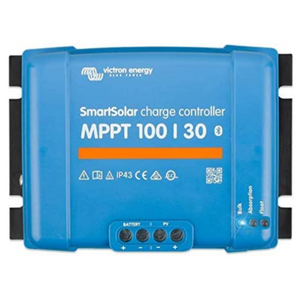 |
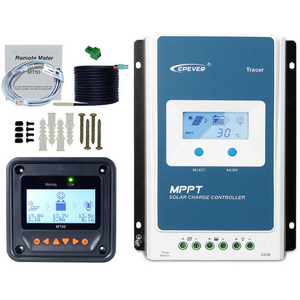 |
 |
| Victron Smart Solar |
Epever |
Renogy |
| Best overall MPPT controller with Bluetooth from a reputable company with long warranty. | Best budget MPPT charge controller with display. Get this if you don’t need Bluetooth. | Best mid-range MPPT charge controller with options to add Bluetooth but has a bad customer service. |
| 12/24V | 12/24V | 12/24V |
| 10A/15A/20A/30A/50A | 20A/30A/40A | 10A/20A/30A/40A |
| Max 100V DC input | Max 100V DC input | Max 100V DC input |
| Lithium Compatible | Lithium Compatible | Lithium Compatible |
| Expensive | Most affordable MPPT | Mid-range MPPT |
| Bluetooth/ No display | Comes with display / no Bluetooth | Order Bluetooth module seperate |
| 5 years warranty | 1-year warranty | 1-year warranty, but many stories of bad customer service |
Let’s look at each charge controller in detail
Victron SmartSolar 100/30
Victron is a Dutch company and well-known brand in DIY solar. It combines reliable electronics with good customer service and long warranties. Their engineering happens in the Netherlands and their products are made in India.
Keeping all these benefits in mind, we can expect to pay a premium price for this product. The customer reviews for this charge controller and the whole brand, in general, is the best in the industry. Just take a look at their reviews on amazon 4.8 stars from 6,452 ratings globally.
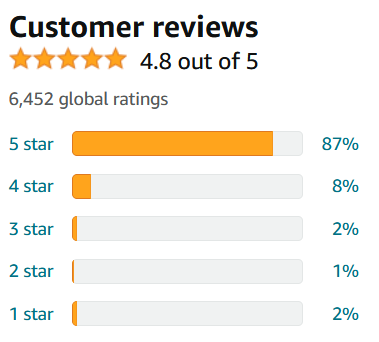
The Victron charge controller selection ranges from 10A all the way to 200Amps. At the end of this article, I will talk more about the big charge controller. These are the most common charge controller being sold:
- 10/75
- 15/75
- 15/100
- 20/100
- 30/100
- 50/100
- 100/450
- 200/450
The first number is the charging current to the battery. If you have a 12V battery and a charging current of 20A, you can half the current by increasing your battery voltage to 24V. This is a good way to save money on your charge controller.
300W of solar panels / 12V battery voltage = 25A charging current -> 30A charge controller
The second number is the maximum input voltage from the solar panels. This is the Voc (volts open circuit) times 1.25 as a safety factor.
21.6Voc * 3 panels * 1.25 = 81V DC -> max 100VDC input
This charge controller is compatible with lithium which you can set and adjust in the Victron connect app.
The size of this charge controller is rather small compared to others on this list. Which makes it ideal for placing in small spots like an RV or boat.
The charge controller has no display but can be monitored with Bluetooth through the free victron connect app.
Epever 100/30
Epever is a Chinese company (Beijing Epsolar Technology) that started in 2007, so it’s not going to disappear anytime soon.
Its tracer AN and XTRA series charge controller are well-known products. They offer the best in terms of price and quality. If you are looking for a budget one that is compatible with lithium, this is the one.
The difference between the AN and XTRA series is that the XTRA series has a greater input voltage of 150VDC.
The charge controller is not as small as a Victron charge controller but it comes with a display that Victron doesn’t have.
To select the charging profile for a 12V battery, select F04, if you have a 24V battery, select F08 (manual).
You can read a review from a customer who had the 30A version for over two years:
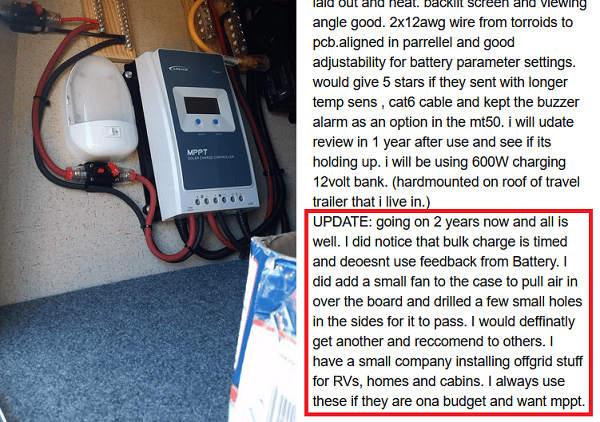
The warranty on this product is 1 year. Stories of warranty claims are overall positive.
I use this charge controller in my test setup. It’s easy to use and the settings can easily be changed which in my case is a LiFePO4 charge setting.
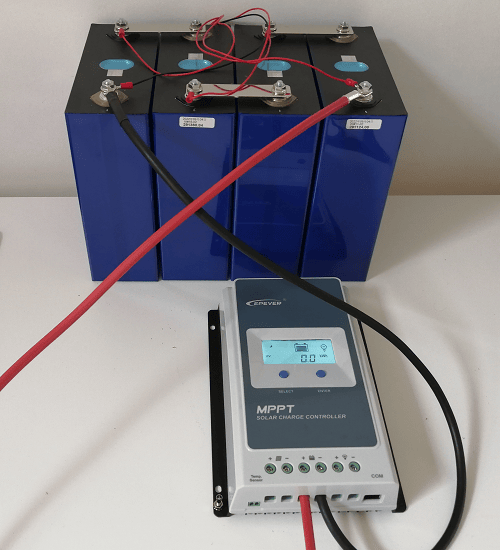
You can add a remote display (wired) that shows the charge controller’s stats. Sometimes this is included in the purchase.
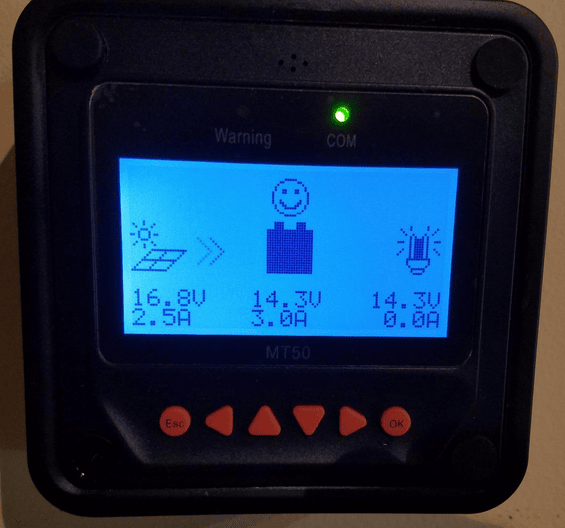
Renogy 100/30A
Lastly, we have the Renogy MPPT charge controller.
We put this charge controller last because there are a lot of bad customer support stories out there. This is not only the case for the charge controller but the brand overall. So that’s why this charge controller would not be my first option.
However, if you get it to work then it’s a good charge controller for decent money. The reviews for this device are overall positive.
The basic unit only contains the charge controller, you need to buy and additional Bluetooth device so you can use it with your phone.
It comes with a display where you can set all the required parameters, so the Bluetooth device is not needed for setup.
They come at the following version:
- 10A (36/48V)
- 20A (12/24V)
- 30A (12/24V)
- 40A (12/24V)
It has the same size as the Epever, is compatible with lithium batteries, and a max input voltage of 100VDC.
Victron SmartSolar MPPT RS 450/100&200
This charge controller is meant for large systems. The input voltage is 450VDC and the current to the battery can be from 100A up to 200A. This charge controller is only suitable for 48V server rack batteries.
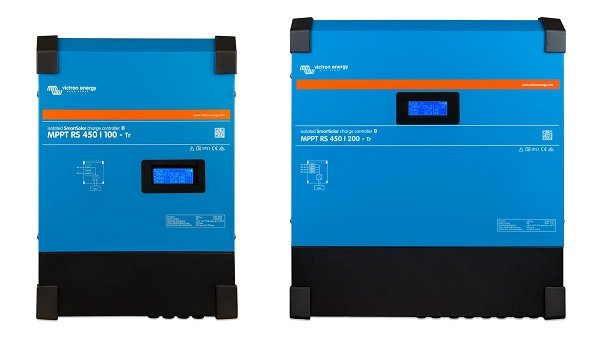
Let’s calculate how many watts this device can support.
52V x 100A = 5,200W of solar
52V x 200A = 10,400W of solar
As you can see, this is for large solar systems. I didn’t know this product existed until a few months ago. That’s why I’m mentioning this at the end of the article if you are planning on building a large solar system.

If you have a small to medium solar system and want lots of functionality and a long warrantee, this is the charge controller you need.
FAQ
Can a charge controller overcharge a battery?
If the voltages are correct, then the battery will not get overcharged.
Most charge controllers have pre-defined voltage levels for different charging profiles. You must match these to your battery type, whether lead-acid or lithium.
Do I need a Dump load for my MPPT charge controller?
No, the excess solar power doesn’t need to go to a dump load when the battery is full. The charge controller acts like a switch.

I’m an off-grid enthusiast. I created this website to give clear and straight-to-the-point advice about solar power. I’m also the author of the book ‘Off-grid solar power simplified‘. Read more about me on my about page, check out my Youtube channel, or send me a message.
Nick, I bought your book, “Off Grid Solar Power Simplified”. I have most of my off grid system purchased and running. I have 4 Relion ,12V, 100AH (P/N TLi100), wired in series to 48V. I checked with the manufacturer and they assured me with that particular part number, series application was ok. I have a Samlex EVO-4248SP inverter/charger. I run a tank of gas through a Honda 2000 each day to keep the batteries up. I just bought 6ea AXI bipremium (P/N AC-550MBT/144V) solar panels. I will wire them in a 3S2P array. Finally to the point, 907Solar here in Alaska is recommending a MidNite Classic 150 MPPT controller. I researched “MPPT reviews” online and no one even mentioned the MidNite brand. I see they sell for just over $600 on Amazon so, before I commit to buying one from 907Solar I figured I’d better get a second opinion. What MPPT would you recommend. You only mention, briefly, a “Rover series by Renogy” on pg. 242 but you don’t come right out and endorse it. I have read in reviews about poor customer service with Renogy.
Hello Dave, make sure to check the voltage of each battery now and then because in series, imbalances might occur. It would have been better to get a single 48V 100Ah (5kwh) battery. Because every cell is regulated by the BMS. Now you have 4 separate batteries who don’t know information of each other. Battery 1 could be at 13V while battery 2 could be at 13.2V, and so on. Midnite is expensive, i don’t know why you would choose them. If you want reliability, go for the victron. Renogy has mixed reviews, if it works it’s good but if something is wrong customer support is not as good.
Ok, to clarify, (Dave from Alaska here). Obviously in the above article to recommend the Vicron. I guess I should have asked if you have any thoughts or concerns on the MidNite Classic 150 recommended by 997Solar?
Didn’t hear a bad thing about midnite. It’s just that they are not available here (europe) so i havent used them before.